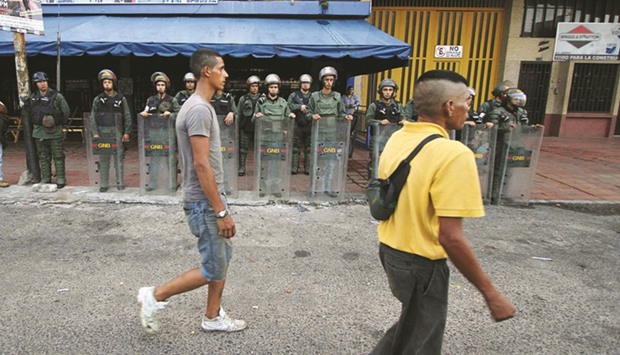Soldiers yesterday patrolled areas worst hit by violence sparked by Venezuela’s cash shortage while neighbourhood groups mounted street barricades and businessmen raked through their damaged shops.
More than 300 people have been arrested, mainly in southern Bolivar state, after several days of protests and looting over last week’s elimination of Venezuela’s largest currency bill.
A 14-year-old boy was shot dead while dozens of people have been injured and hundreds of stores ransacked.
Some rioters targeted Chinese-owned shops, witnesses said, prompting concern in Beijing.
In response to the mayhem, Venezuela’s socialist President, Nicolas Maduro, has postponed the elimination of the 100-bolivar notes until January 2 in order to allow time for new larger bills to enter circulation.
The removal of the 100-bolivar bills, before replacement notes were in place, caused chaos with many people unable to pay for basic goods and transactions in the busy run-up to Christmas.
That heaped hardship onto Venezuelans already suffering scarcities of food and the world’s highest inflation.
In Ciudad Bolivar, capital of the mineral-rich and jungle-covered Bolivar state, residents formed barricades in the streets to protect themselves and shops from further violence.
More than 350 outlets have been ransacked there since Friday, business leaders say.
The opposition said there had been five fatalities in Bolivar state, citing a local newspaper investigation, but Reuters could not confirm that.
In the Andean highland town of La Fria, in Tachira state, rubble and packages lay strewn on the ground yesterday, witnesses said.
Eight Chinese-owned food stores were among the outlets ransacked, the local governor said. Some local government offices also were attacked, one by arsonists.
National Guard soldiers stood watch.
Maduro said the currency measure was needed to fight back against criminals he said are hoarding bolivars to fuel contraband and sabotage his leftist administration.
He also accused political opponents of whipping up violence, at the behest of US President Barack Obama, to seek a coup against him.
Washington denies constant accusations of meddling, although government supporters recall US approval of a short-lived coup against Maduro’s predecessor, Hugo Chavez, in 2002 during the George W Bush administration.
Opposition leaders say Maduro has only himself to blame for incompetent economic policies that have stirred Venezuelans’ anger.
Opponents are now calling for Maduro to resign after having had their push for a referendum to remove him thwarted by election and judicial bodies who seldom go against the government.
The 54-year-old former bus driver and foreign minister, who replaced Chavez in 2013, has seen his popularity plunge during a three-year recession. His term runs to January 2019.
Meanwhile a jetload of new currency has arrived in Venezuela.
“There are 272 crates of 50,000 500-bolivar bills,” Venezuela central bank’s number-two official Jose Khan said on state-run television.
Khan said this first shipment would be followed by two more, adding up to 60mn units of the 500-bolivar bill. Denominations of up to 20,000 bolivares are expected to follow.
Maduro had earlier blamed the delay in the notes arrival on “US treasury department sabotage.” The bills were made in Sweden.
Maduro’s government also blames speculators for hoarding the 100-bolivar bill. The country’s borders with Brazil and Colombia have been shut until January 2 in a bid to boost security and put a dent in black marketeering.
Analysts have warned there is a risk of unrest in Venezuela, which Human Rights Watch says is in the grips of a “humanitarian crisis.” Anti-government protests in 2014 led to clashes that left 43 people dead.

Venezuela’s National Guard soldiers in riot gear keep watch on the streets of La Fria, Tachira state, Venezuela.
